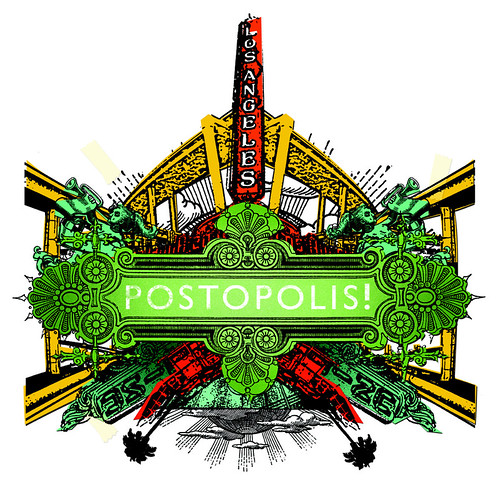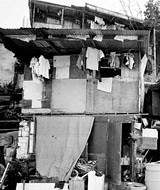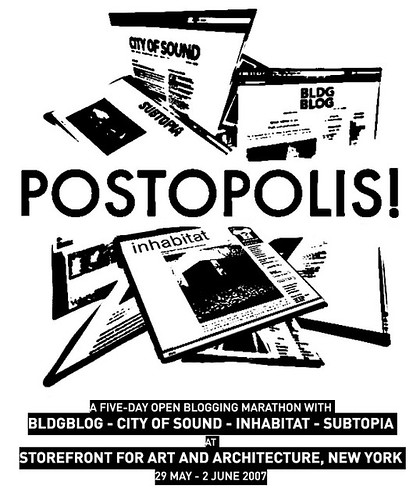Decoding Military Landscapes: #demilit

Tomorrow morning, Javier Arbona, Nick Sowers and myself will be convening at UC Berkeley to conduct a workshop for the Towards a Just Metropolis conference that is being held there over the weekend. The conference itself looks pretty good, lots of excellent presentors and topics coming together to further break down the tangled relationships between justice, spatial practice, and the city. If I had more time (and more money for an all inclusive conference registration ticket…oh the irony!) I would definitely be spending a lot of the weekend there.
Be that as it may, I am really exited about our workshop – Decoding Military Landscapes – that will be held tomorrow from 10:45 – 12:15. Hopefully we will recruit some others who are interested in rethinking the meaning of the contemporary archive, the production of public knowledge, and the crisis of the spatial condition, to carry this with us further into development, at a time our political climate seems ever more cloaked in secrecy, and the nature of ‘metropolitan’ all the more radically hijacked by the spectral spaces of militarism. If everyone were to become an observer and register of militarization's hyper-urban and spacio-political expansion, then what kind of infrastructure could we imagine to facilitate this? If we could turn the archival logic of the surveillance apparatus and the bureaucratic mechanisms of political secrecy against itself – or, if we could hijack the panopticon to, in effect, record itself and to measure its own dubious footprint which so far continues to evade public scrutiny – then what sorts of tools, what kinds of archival practices could be deployed towards the democratization of a new citizen monitoring of space? Could the archive not just be a measure of space, but a new public production of space; an open source archiving amounting to justice as a form of spatial practice?
Anyway, that’s just a glimpse. And hopefully, this will mark the beginning of an evolving project that will come out of this over time. For some additional info, here is the official text for the workshop.
TOWARD A JUST METROPOLIS: From Crises to Possibilities June 16–20, 2010 Conference • San Francisco Bay Area
#DECODING MILITARY LANDSCAPES //18 JUNE 2010 (check website for final details) // A PARTICIPATORY WORKSHOP TO DEVELOP A PUBLIC ARCHIVAL PRACTICE: come join a working group that will brainstorm an open-source archival tool to catalog and examine the legacy of military urbanization.
We want to begin with the premise that: the crisis of the contemporary spatial condition is produced in part by the hyper-expansion of militarization, operating in realms removed from public scrutiny and agency.
SHARE THIS PAGE: http://bit.ly/demilit
Military space enforces conformity to a single prevailing mode and ideology of power. While space can be produced or transformed by a multitude of competing ideological claims (each of which in their own right may correspond to a certain context of ‘militancy’ and/or ‘militarization’), for this workshop military space is simply meant to connote the existing physical environment or imagined environments as these are configured by military power, including private corporations. This generic definition is intended to broaden the scope of what military space is, how it can be perceived in a spectrum rather than as spatial object, how it can be engaged, recorded—or archived—avoiding any preconceived idea about how military space does or does not manifest itself.
The legacies of the military exist at every scale of our society, from the historic bunkers of old military bases and tourist landmarks of earlier wars, to more central monuments like the Pentagon and its constellation of financial towers that serve the defense industry. While the army base epitomizes the most literal entrenchment of military space, its sphere expands from the cordoned barracks to the terrestrially detached orbital satellite.
The spatial dimensions of military power persist at the very core of our society on through the grandest public infrastructure, and continue all the way to the atomized in the form of RFID tags, biometrics, video games, GPS systems, and our SSNs. Suffice to say, the environment has always been constituted by the spatial forces of military evolution, but today hegemonic power only seeks to further erode any previous distinctions between ‘military’ and ‘civil’ space at unprecedented scales. Military space is now a pixilated blur of infiltrating actors —wealthy and legally insulated—whose logic poses great threat to the interfaces between ‘public’ and ‘private’, ‘human’ and ‘mechanic’, ‘transparent’ and ‘fortified’, ‘civic empowerment’ and ‘subjugation’.
Why an archive? What is the political crisis of current archival practice? What should a public archival practice look like?
Archiving has always been a critical task to the preservation of historic fact, national memory, and artifacts. However, with the rise in power of certain hierarchies and agencies responsible for this (from the Government to local historic preservation societies), the artifact has lost its potency, and a new political crisis of archiving has foisted itself upon the historical landscape. The artifact (the ruin, the memorial) is reproduced, or even manufactured, in the act of its preservation, and the more pertinent memories of political violence that are embedded within it are sanitized in order to make way for new methods of presentation. The military-historic legacy of a battlefield, for instance, is often stripped of its colonial details in order to meet a more suitable musealization of memory, and the artifact becomes yet a new weapon in the legacy of colonialism and in a war on memory itself.
Further, the artifact is too often hoarded by the agency of the archivalists themselves, and become useless in the public’s ability to engage them with new purposes and for the making of a future knowledge or collective plan. This distance between the hoarded artifact and the public’s desire to study and repurpose the artifact creates a political void that suspends the artifact in a kind of historic formaldehyde, and defeats the purpose of archiving itself. If the evidence that society gathers and stores from history can no longer be used by the public to generate new knowledge then what is the point of archiving in the first place?
We want to not only challenge the current practices of memorializing as a system of power, but to expose the techniques of this as they are rooted in the very production of military space.
That is to say, the production of military space is intertwined with the politics of archiving and the politics of memory. We hope to explore and decode these in this workshop. The web itself, of course, is the archetypal example of a military-industrial complex archival practice, and the paradoxical nature of working with the web is up for critical examination as well. We welcome hacking and hackable project ideas.
The hierarchies of archiving and the gathering and storing of evidence raise a number of questions about our informational society and the power structures of governance that arise from its practice. If the stated goal of archiving is to preserve history in a collective sense of the public, then we aim to challenge this status and the prevailing privatization of archiving as it is currently practiced. We want to start by asking, who are these archives predominantly designed to serve and who are they meant to exclude? If the results of archiving cannot be made uniformly accessible to all, then what is meant by ‘archive’?
What comes out of this workshop? Come join us and be a part of the outcomes!
We seek to reclaim the archive from forms of militarization and devise a tool or a practice that can be used by individuals and communities. Ideally, we would like this imagined instrument to be applied to the struggles against military urbanism in all its forms: “gang injunction zones” and designated “free speech zones”; Army recruiter-desiged video games and Second Life virtual space; nuclear waste transport corridors; privatized military housing, and so on and forth. Maybe it looks a bit like the Creative Commons badge and can sort search results. Maybe it persists through a Twitter hashtag such as #demilit. The archive will contain a diverse range of media from sound recordings to video clips. Whether it is hosted on its own server or on an existing social network, the archive will be open, dispersed, hackable and mutable. As such, we can make visible a more pervasive post-9/11 security landscape that eludes scrutiny.
Through public dialog we will develop the concept for a new media-driven public broadcast project that can be of equal use to citizens, researchers, activist groups, historians, and a host of other communities struggling to confront the urban realities of militarization.
During the workshop, we will synchronize the efforts of interested parties to produce a prototype of the #demilit archive .
Who is leading this workshop? The organizers of this workshop [ Bryan Finoki Subtopia | Javier Arbona UC Berkeley | Nick Sowers Soundscrapers ] will offer their experience as military scholars and web creators to foster new collaborative and inter-disciplinary methods for conducting citizen research. Influenced in part by the work of experimental geographers like Trevor Paglen, and databases like the Center for Land Use Interpretation and Cryptome.org, we propose that art, photography, journalism, cartography, sound recordings, activism, historical archives, mobile technologies, social webs, oral histories and networks of physical exhibition spaces can be mobilized to record, expose, and redesign the vast dimensions through which military urbanism permeates cities and towns.







1 Comments:
I Just found this blog, fucking brilliant. I am very interested in Urban sounds and stress reactions.
Will follow, keep it up!
Michael-
http://triptaminedream.com/
Post a Comment
<< Home